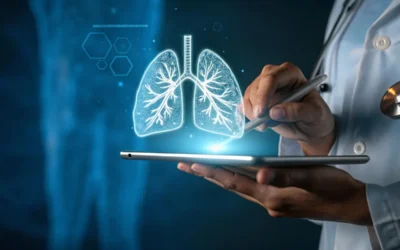In recent years, the landscape of oncology has experienced a monumental shift with the advent of liquid biopsy technology. Spearheaded by pioneering figures like Max Diehn from Stanford, liquid biopsies have ushered in a new era in cancer diagnosis and treatment, specifically in monitoring cancer recurrence and facilitating early intervention.
This groundbreaking technology emerged initially with a singular aim: detecting the reappearance of tumors in patients’ post-surgery. By harnessing a simple blood test, liquid biopsies present a paradigm shift in cancer care by enabling the identification of relapse at its nascent and most treatable stage. The potential to revolutionize the management of cancer, particularly in its early stages, holds significant promise for patients and healthcare professionals alike.
Table of Contents
Broadening Horizons: Multicancer Early Detection
As liquid biopsy technology has evolved, its applications have expanded significantly. Groundbreaking tools such as the Galleri test, supported by extensive studies like CCGA (Circulating Cell-free Genome Atlas), have propelled the field towards the realm of multicancer early detection. Envisioning a future where regular and precise cancer monitoring becomes as routine as managing chronic diseases, liquid biopsies offer the potential to transform patient outcomes, extending lives through timely interventions and improved treatment strategies.
The comprehensive analysis facilitated by liquid biopsies marks a significant departure from traditional cancer detection methods. By utilizing a simple blood sample, these tests have the capability to identify various cancer types simultaneously, providing a panoramic view of an individual’s cancer status, thereby enabling early intervention and personalized treatment approaches.
The Dual Role of Liquid Biopsies in Cancer Screening
Liquid biopsies operate on a dual front in cancer screening – serving patients with a history of cancer and asymptomatic individuals. For those with a cancer history, liquid biopsies target specific mutations from prior tumors, allowing for a focused approach to detect early signs of recurrence. On the contrary, screening asymptomatic individuals poses a unique challenge. In the absence of prior tumor DNA for comparison, liquid biopsies meticulously analyze genetic material to identify subtle methylation patterns and mutations indicative of cancer, offering the potential for early detection in otherwise asymptomatic cases.
The ability of liquid biopsies to detect minuscule amounts of cancer-originated cell-free DNA (as low as 0.01 to 0.001%) showcases their efficacy in identifying early-stage cancers. Leveraging the genetic signature obtained from the initial tumor surgery, these tests scrutinize cell-free DNA in the patient’s plasma, providing crucial indicators of cancer presence.
Grail’s Galleri Test: A Paradigm Shift in Cancer Detection
A beacon of innovation in the liquid biopsy domain is the Galleri test by Grail. Through its comprehensive DNA analysis, this test heralds a new era in cancer detection. By enabling early identification and intervention, the Galleri test significantly improves outcomes for both cancer survivors and individuals without any symptomatic manifestations. This progressive approach marks a milestone in personalized medicine and elevates the standard of care in cancer diagnostics.
The Role of Fragmentomics
Diving deeper into the realms of genetic analysis, liquid biopsies don’t solely focus on mutations but also analyze DNA fragment lengths. When cancerous cells shed DNA into the bloodstream, they do so in distinct patterns known as fragmentomics. Studying these patterns provides critical insights into the presence, type, and stage of cancer. This innovative aspect of liquid biopsy technology expands our understanding of cancer biology, enhancing our ability to characterize and monitor the disease’s progression more accurately.
Delphi’s Scientific Breakthroughs
Enterprises like Delphi have emerged as pivotal contributors in advancing fragmentomics. Their focused efforts aim to refine and improve the sensitivity and specificity of liquid biopsies. Through their groundbreaking work, Delphi and similar organizations have played a crucial role in differentiating DNA from cancerous and non-cancerous cells. This enhancement in accuracy further strengthens the reliability of liquid biopsy tests, positioning them as an indispensable tool in cancer diagnostics and treatment.
Advanced Technologies in Liquid Biopsies
The prowess of liquid biopsies in detecting minuscule quantities of cancer DNA is largely attributed to the integration of cutting-edge technologies. Next-generation DNA sequencing and AI machine learning algorithms stand at the forefront, enhancing the sensitivity and specificity of liquid biopsies. These technologies empower the identification of early-stage cancers that traditional methods might overlook, epitomizing the essence of precision medicine in cancer care.
Determining Cancer Presence or Absence
Liquid biopsies, as diagnostic tools, discern cancer presence by identifying genetic materials like cell-free DNA shed by tumors into the bloodstream. This method’s inherent advantage in early cancer detection becomes evident, especially for tumors too small to be discerned by conventional modalities like CT scans and ultrasound. The ability to identify such minute traces of cancer-originated DNA opens doors to a new realm of possibilities in early intervention and more precise monitoring.
Gaining Insights into Cancer Biology
Beyond its primary role in detection, liquid biopsies offer profound insights into cancer biology. By analyzing tumor DNA present in blood samples, oncologists gain critical knowledge about the tumor’s molecular makeup, including specific mutations and methylation patterns. This information forms the cornerstone for tailoring targeted therapies and monitoring the response to treatment, marking a significant shift towards personalized and more effective cancer care strategies.
Conclusion: A New Frontier in Cancer Detection and Treatment
Liquid biopsy technology signifies a monumental leap forward in the realm of cancer detection and treatment. As this technology continues to evolve and refine, it holds the potential to revolutionize cancer care fundamentally. By enabling earlier detection, facilitating personalized treatment strategies, and ultimately improving patient outcomes, liquid biopsies stand as a beacon of hope and progress in the ongoing fight against cancer.





0 Comments